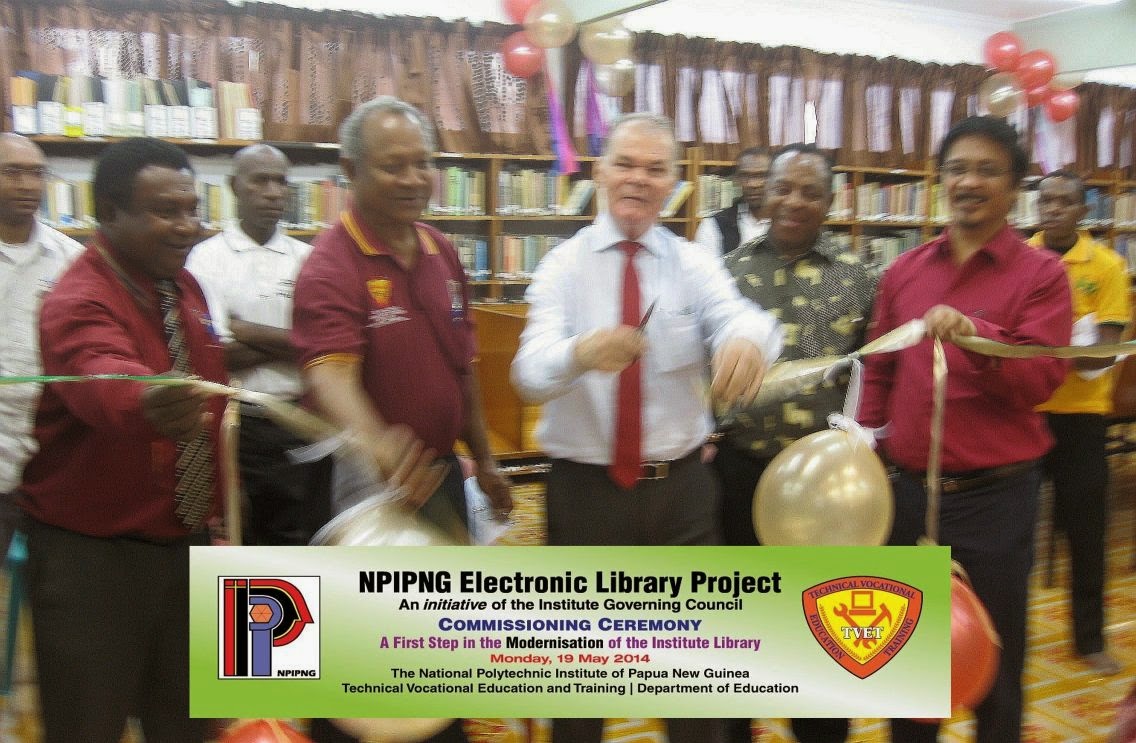‘Growth, excellence and prosperity
through quality education and training’
Commissioning of
LIBRARY
COMPUTER LABORATORY
and launching of
NPIPNG ELECTRONIC LIBRARY PROJECT
19th May, 2014
Mr. McLay addressing
the Institute's council chairman, administrators, staff and students.
The
National Polytechnic Institute of PNG is currently undergoing infrastructural
improvements and changes as part of its change of status. These changes or
improvements are necessary to help both the students and the staff. One of the
changes is the improvements of Institute
Library as learning becomes more computer-oriented and computers are
becoming a vital part of learning. Therefore, in line with the Governing
Council directives and Students’ expectations, the Administration has taken the
initial step in improving the Institute Library under the project titled
“NPIPNG ELECTRONIC LIBRARY PROJECT”. It is envisaged that by Year 2016, NPIPNG
will modernised it’s library through this project.
Mr. McLay cutting the ribbon with Director Mr. Grahan Bidang,
Council Chairman Mr. Kila Vuivagi, Deputy Director Administration Mr. Chris Wani
and Deputy Director Academic Mr. Joselito Marcos.
The
library is now seeing new improvements, with the first being the installation
of a computer laboratory. The computer laboratory in the Library is configured
differently from the rest of the computer laboratories in the institute. This
laboratory consists of one common server computer, and ten (10) terminals (to
be increase over the period of the project). All the ten terminals are
connected to this one common server and operate from that server. Each terminal
has a monitor, mouse, keyboard, headphone and a USB port for students to use.
The server is just one computer with all the programs installed. For backup
purpose the Library Server will be connected to Institute’s central Server.
The advantages of the Library Computer
Laboratory configurations are:
1. Minimal
cost of purchase and setup
2. Minimal
cost of ongoing maintenance – only one maintenance is done to the server
3. Minimal
cost of program installation – programs installed one time only in the server
and becomes available instantly to all terminals
4. Reduces
electricity bills – terminals consume very little power
5. Control
– the server controls all the terminals, so there’s no abuse or misuse in terms
of printing or doing other things
6. In
the long term, there’s huge savings on computer maintenance, program
installation, and also electricity bills.
Currently, the setup in the library will
benefit both staff and students but more importantly for students’ learning in
the following ways:
1. Students
now have access to a computer even after hours, when all the departmental
computer labs are closed;
2. Students
can use programs such as MS Office 2010, MYOB, Encyclopaedia, Dictionary, which
are installed in the server, and available to all terminals;
3. Students
can print their assignments, projects, and reports directly to a common network
printer, which is readily available in the library;
4. An
e-Library program is also installed, where the students can access to read
softcopies of books. However, we have yet to purchase some e-Books and get them
installed in the e-Library program;
5. Students
can listen to audio lectures using the headphones which are also available;
6. Students
can use their USB flash drives to save their work or even print their work from
the flash drives;
7. Even
though there are only ten terminals, compared to the number of students, the
system is programmed such that each user is timed using “tickets”. For example,
if a student uses Terminal-1, then the student will be given a ticket to login
and use the terminal for exactly one hour to complete his/her work. As soon as
the time reaches one hour, the system will automatically log out the student,
close all the programs that the student was using, and reset the terminal for
the next user. In that way, other students are given opportunities to use the
terminals.
This is just the first step into the
modernising of NPIPNG Library through the “NPIPNG Electronic Library Project”
Looking towards the future, the modern
NPIPNG Library will have;
1. library
resources (textbooks and other reference material) available electronically;
2. an
Internet and Email facility for students and staff. Internet is now becoming
vital in terms of sourcing information, especially in research or assignments.
In fact, most of the information on the Internet is updated, and having access
to the Internet, e-Books can also be downloaded as additional resources. The heart
of any learning institute such as NPIPNG is the Library, and with this
improvement in the facility, it means an improvement in the students’ learning
and acquisition of knowledge.
3.
Library access opening hours will increase
and will open seven(7) days a week during the Academic Calender period.


+addressing+Polytec+council+administrators+staff+and+students+during+launching+of+Electronic+Library+project.jpg)

No comments:
Post a Comment